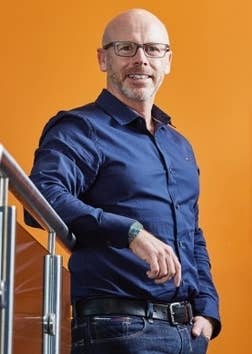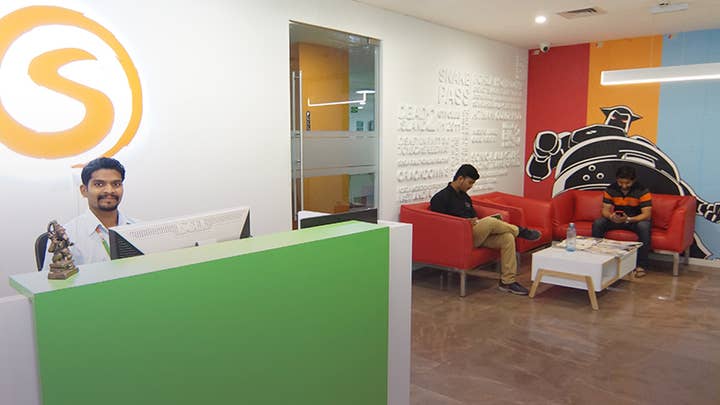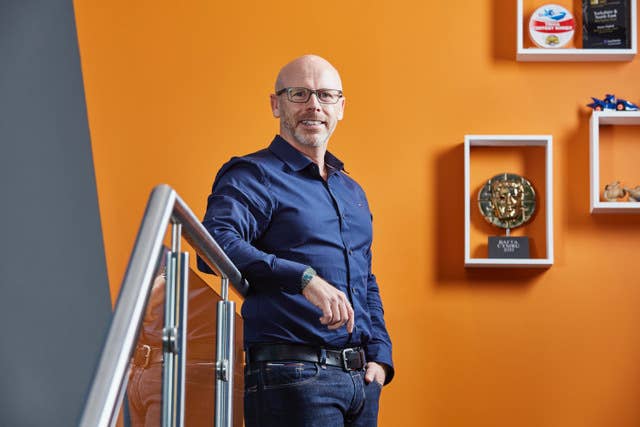Sumo Group CEO: "We're only as good as the last game we make" | GI Live Online
During our event, Carl Cavers revealed how the UK firm earned the trust of Xbox and PlayStation when handling first-party IPs
If they want to attract -- and retain -- collaborations with some of the game industry's biggest players, independent developers need to ensure they "absolutely deliver" on its promises.
Still flush from its BAFTA success -- the delightful Sackboy: A Big Adventure secured not one but two awards at last month's BAFTA Game Awards -- Sumo Group believes it walks the walk when it comes to honouring its commitments.
"We've got a saying at Sumo: we're only as good as the last game we make," Sumo Group's CEO, Carl Cavers -- an industry veteran who founded Sumo with three partner founders back in 2003 -- told us during our recent GI Live Online event. "We put everything into ensuring that that game is the best it possibly can be by the time it comes out."

Cavers posits it's this mantra that has fuelled Sumo's accomplishments. The company prides itself as being one of the UK's largest providers of end-to-end game development, specialising in collaboration and co-development services. It's these pivotal partnerships with companies like Sony and Microsoft that have propelled Sumo's success, which recently posted revenues of £68.9 million and revealed an astonishing year-on-year growth of 40.7 per cent.
"We love collaborating," Cavers explains. "We do take on responsibility for doing whole game development -- from the idea right the way through to final delivery -- but we believe that collaboration gives you something extra, and working with the right people -- talented and creative, passionate people -- is the right thing to do."
But how do those partnerships come about in the first place? Sumo has been trusted with some of the industry's most cherished IPs, including the closest thing Sony has to a mascot -- Sackboy himself -- but how on earth does an independent studio attract that kind of attention?
"I think you'll start to build a good, solid reputation if you deliver what you set out to deliver," Cavers says. "Ideally exceed it -- be cautious about what you promise -- but at the same time, make sure that you absolutely deliver what you said you're going to deliver.
"[You have to put] a lot of effort into the working relationship. It's not about a commercial relationship at that point -- it's about the working relationship -- and how you can work together to realise a better game at the end of the day. And we value input from our partners as much as they value our input to try and make the game the best that it possibly can be.
"You'll start to build a good, solid reputation if you deliver what you set out to deliver. Ideally, exceed it"
"We're quite humble in what we do -- you know, we don't try and take over from the publisher," he adds. "In terms of the ownership of the game or the IP, we stay in the shadows. They're responsible -- it's their game, it's their IP. But we're responsible for giving them quality."
Sumo's positive approach to collaborations may be the secret to its success. While some work-for-hire studios may only see working collaboratively with other game makers as a stepping stone to independence and developing their own IPs, even a BAFTA award isn't enough to tempt Sumo away from what it thinks it does best.
"Why would we not want to work on some of the world's best IP?" Cavers laughs. "You've seen what we've released, but there's also a ton of stuff that's confidential that we can't talk about. We've got 40 projects with 28 different clients at the moment within Sumo Group, and I think I can talk about seven projects out of that 40.
"We are tremendously passionate about working with great IP, because it attracts great talent, and it creates a really positive and creative atmosphere as well."

Talent acquisition has seen the company branch out into developing its own ideas, too, of course -- sometimes it's "about having a creative outlet for our teams" -- and seen the team swell from its humble beginnings to a global player that employs over 1,000 people all over the world.
Things could have been very different, though. In 2007, Sumo was sold to Foundation Nine Entertainment. It was "a difficult time", of course, and the global recession hit many industries hard, "not just in the video game space". But in 2012, Cavers felt that Sumo's "ambition as a studio and our business and as founders wasn't being realised" as it was often stretched to support other operations within the parent company, which led to buying back the company in 2014.
"Keep going, and don't be afraid to ask for help... You'll learn a lot, you'll progress quickly and just keep going"
But how did Cavers and his partners pull it off with a "tremendously supportive" private equity firm?
"Find the people that can give you the right advice," he says. "Without a doubt, we had the right advisors on board to help us through that process and ensure that we had a balanced outcome. We wouldn't have achieved that on our own if we didn't get the right advisors, so I would always stress to somebody that's going through a process of investment -- or looking to grow their business in a way that attracts investment -- then they should be taking some independent, external advice.
"There's been a lot of activity in our space over the last decade, which means there's a lot of knowledge from advisors. So I'd encourage anybody to speak to advisors and listen to them."
The expansion of the company didn't stop there, and just a few years later in 2017, Sumo went public, valued at £145 million. But when does a studio know when -- or even how -- an IPO could benefit it?
"Coming to the market allowed us to pay off the debt," Cavers explains. "And that's one of the reasons you've seen Sumo accelerating growth. So when we did the management buyout in 2014, we had 236 people; when we floated at the end of '17, we had 499 people. Today, we are 1,043 people and growing, and we wouldn't have been able to do that had we got a level of debt, because we wouldn't be able to reinvest in the business in terms of capex, locations, acquisitions. So losing the debt has been great freedom for the business."
That freedom "does come with a trade-off", though. Cavers says he has to present to the City every six months, but says it works for Sumo because he values -- and honours -- the partnership with his investors just as he does any other collaboration the company strives to honour.
"You've got to deliver what you promise, but we've always been in that environment," Cavers says. "So we treat the City like a normal project, you know? [When] we commit to a partner, we say this is what we're going to do... and that's exactly what we deliver."

Interestingly, he also thinks the pivot to digital distribution and the step away from cylical release windows has helped investors grow more confident in backing big game companies now, too.
"The video game market is no longer cyclical. Digital distribution has made a massive impact on the predictability and regularity of sales," he explains. "There was a massive investment in physical goods. It tied up a lot of cash.
"We stay in the shadows. It's their game, it's their IP. But we're responsible for giving them quality"
"Publishers are in a completely different position today, but it took a long time to re-educate the market, and the market -- to give them credit -- have spent a lot of time educating themselves. Businesses like Keywords, Frontier, Team17 -- and, to some degree, Sumo -- spent a lot of time with a lot of analysts and investors, educating them on the video game space and how it now operates. And because it's been de-risked significantly away from physical goods -- and it's no longer cyclical -- it's made a big difference to how predictable the sales and market can be.
"And ultimately, analysts look for a level of predictability," he admits. "And it can now get that from the video game space. It's just a shame that some of the businesses that we had back in the day didn't get the same level of support in the UK that the publishers got in the US, otherwise, they might have still been around today."
So what advice does Sumo Group's CEO have for indie studios that might be considering going public, and how does a company begin to prepare for that? Cavers admits that for smaller studios, "it's quite a burden".
"You do need to ensure you've got a lot of professional management systems in place, you know, in terms of how you report your accounts, how you're managing your business. It is quite expensive to be on the market -- the amount of governance and burden on reporting comes with the level of expense, so you should accept that.
"But at the same time, [it] shouldn't put people off. Aspire to do what you want to do, whether that be a trade sale, whether that be taking private money and doing it on the private side. Although debt doesn't work for Sumo because of the style of business we are, it might work in a different environment. If you're just all-out on creating your own IP, and you've got an investor that can help you support the debt in a different way, then that might be the way to go.
"But be aware that you do relinquish a lot of ownership at that point in time. So even though you can retain a significant stake in the business, you're accountable to a lot of people and ultimately, you know, some of those investors of pension funds. You feel you've got a duty of care and responsibility to make sure you do deliver what you said you're going to deliver."
It's this commitment to following through on its promises that has put Sumo in such good stead, and Cavers says without the advice of the experts and the diversity of opinion, things could have been very different. He says that working with like-minded people with similar cultures is also important; Sumo prefers to work with -- and even acquire -- businesses that "treat people right".
"Keep going, and don't be afraid to ask for help," he says, reflecting on what he'd tell other start-up developers. "I think one of the secrets of Sumo's success is having four founders. I can't imagine how difficult it is for a startup or an early-stage development business to have one founder with all that responsibility. So get yourself some help if you're in that position.
"And if you're not in that position, and you've got a team of people around you, still ask for help from externals. You'll learn a lot, you'll progress quickly and just keep going. It is hard work, but it's enjoyable."
You can watch the full interview below:


